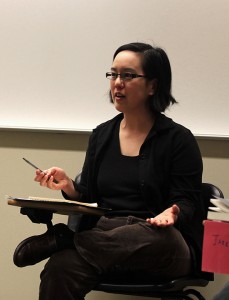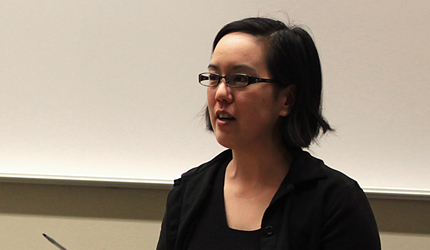
Dr. JoAnn Tsang, associate professor of psychology and neuroscience, teaches the Psychology of Religion course which challenges students to look at religion in a new way.
Psychology class explores social side of faith
By Stori Long
Reporter
At a university where every student is required to take two semesters of Chapel, it is no surprise that the study of religion and faith works itself into many different facets of study.
Psychology 4339, Psychology of Religion, is one of the those classes attempting to provide Baylor students with a different perspective on religion and religious experiences.
“The class focuses on the social psychology of religion,” Dr. JoAnn Tsang, associate professor of psychology and neuroscience, said. “Social psychology describes how we are affected by the presence of other people. … This is fun to apply to religion because people are usually religious in front of other people.”
Tsang said this is particularly relevant to religion because no matter a person’s faith, the way someone treats the people around them is often dictated by what relig-
ious creed he or she follows.
The class also explores how people react to the religious experiences of others. People in groups are much more likely to have religious experiences if those around them also claim to be having them, Tsang said.
“This is particularly relevant to those who may want to enter into the Christian counseling profession,” Tsang said. “With this kind of knowledge in mind, it might encourage a counselor to take those mountaintop ‘come-to-Jesus’ moments with a grain of salt.”
The class is very dialogue driven, with Tsang serving as coordinator and assuring that the class stays on topic. The students read and discuss various authors, ranging from the religious to the atheistic, who have written about the social and cognitive factors of religious experience, such as social pressure, political propaganda or mental stability.
“It’s very interesting to read so many varying opinions on a topic that is important to so many people,” Seattle senior Alyssa DeMoss said. “It’s amazing that so many different thinkers can look at the same topic and come to so many different conclusions.”
The class is primarily composed of psychology majors, but also includes some religion majors and a few students who are double majoring in both.
In dealing with a topic as personal as religion, Tsang stresses to her class the importance of keeping an open mind and respecting all opinions.
“Religion is something we study scientifically in this class, and people are pretty good about it,” Tsang said. “I figure it’s a 4000- level course; everyone should be prepared at that point. We don’t all have to agree. We just have to agree to be nice.”
Tsang said she hopes this friendly class atmosphere will help foster a healthy dialogue. The students come from varied religious backgrounds, and the discussion is not exclusive to any one religion but seeks to study how people respond to any sort of religious experience.
“If we all just agree with each other all the time, there would be no discussion. I’m thankful the climate is comfortable enough for people to talk,” Tsang said.
This tolerance and ability to listen and take seriously various opinions toward any issue is one of the fundamental skills Tsang wants her students to take away from the class.
“I enjoy it when students come at an issue from all angles,” Tsang said. “I love seeing people’s reaction when they are exposed to something they’ve never thought of, spurring critical thought.”
Tulsa senior Amy Liu echoes this sentiment and said exposure to different opinions and beliefs is one of her goals in taking the class.
“I hope to gain more and different perspectives on religion, and why different people believe different things,” said Liu. “Especially at a Baptist university, you don’t get exposed to much more than the usual conservative Christian religion. … It would be good to broaden those horizons a little bit.”



